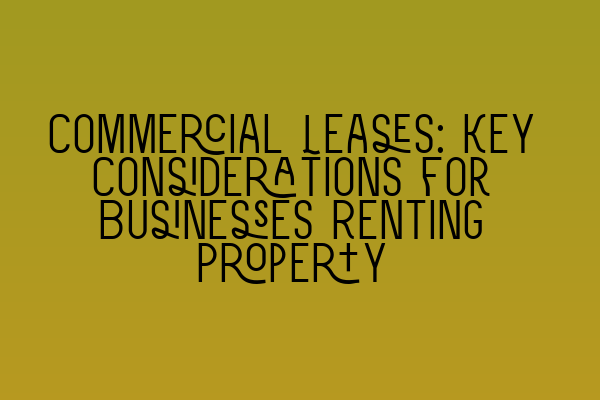Commercial Leases: Key Considerations for Businesses Renting Property
When it comes to leasing property for your business, there are several key considerations that every business owner should keep in mind. A commercial lease is a legally binding agreement between a landlord and a business tenant, outlining the terms and conditions of renting a property for commercial purposes. To ensure a successful lease arrangement, it’s essential to understand the important factors involved. In this article, we will dive into the key considerations that businesses should be aware of when renting commercial property.
1. Lease Term and Renewal Options
The lease term is a crucial aspect to consider. It determines how long you will be occupying the property. Commercial leases typically have longer terms compared to residential leases, ranging from three to ten years. Before signing a lease, consider the growth projections of your business and ensure the lease term aligns well with your future plans. Additionally, discuss renewal options with the landlord to secure your business’s long-term occupancy in the property.
2. Rent and Operating Costs
Rental costs significantly impact a business’s financial stability. When negotiating the rent, consider factors such as market rates, location, and the condition of the property. It’s also essential to understand the operating costs associated with the lease. These costs may include maintenance fees, property insurance, property taxes, and utilities. Make sure you have a clear understanding of your financial obligations under the lease agreement.
3. Use Clause
A use clause is a provision in the lease agreement that outlines the specific activities that are permitted on the premises. It is important to ensure that the allowed activities align with your business’s operations. For example, if you are opening a restaurant, you need to make sure there are no restrictions preventing the preparation and sale of food. Understanding and negotiating the use clause can avoid future conflicts with the landlord.
4. Repairs and Maintenance
Clarifying the responsibilities for repairs and maintenance is crucial in a commercial lease. Typically, the landlord is responsible for structural repairs, while the tenant is responsible for maintaining the interior and minor repairs. It’s essential to review the lease agreement carefully and understand who bears the costs and responsibilities for repairs, as well as the process for reporting and resolving maintenance issues.
5. Assignment and Subletting
Business circumstances may change over time, and you may need to assign or sublet the leased property. It’s important to review the lease agreement to understand the landlord’s policies regarding assignment and subletting. Some leases may require the landlord’s consent, while others may prohibit it altogether. Knowing the options available in case you need to downsize, expand, or transfer the lease can save you from potential conflicts in the future.
6. Termination and Break Clauses
Unforeseen circumstances can occur in business, leading to the need for early termination of the lease. Understanding the termination and break clauses is essential. These provisions define the conditions under which either party can terminate the lease before the agreed-upon term. Analyzing these clauses carefully and negotiating favorable terms can protect your business from financial and legal repercussions.
Navigating Commercial Leases with SQE Property Law & Land Law
Renting commercial property involves intricate legal considerations. As businesses vary in their nature and requirements, it’s crucial to consult a qualified property law solicitor to ensure that your lease agreement aligns with your business goals and protects your interests.
At SQE Property Law & Land Law, we provide expert legal advice and assistance to businesses in navigating the complexities of commercial leases. Our solicitors have vast experience in contract law, including commercial leases, ensuring that your lease agreement is thorough and comprehensive.
Our team understands the ever-changing legal landscape and will ensure that your lease agreement is up to date with the latest regulations and best practices. We prioritize ethically sound legal practices and can assist in addressing any ethical concerns that may arise during the lease negotiation and drafting process. To learn more about ethics in contract law, check out our article “Ethics in Contract Law: Navigating the Moral and Legal Dimensions.”
Misrepresentation is a critical issue that businesses should be aware of when entering into contracts. Our article “Misrepresentation in Contracts: Unveiling Deceptive Practices” offers valuable insights to help you avoid falling victim to deceptive practices during lease negotiations.
If you are studying for SQE Contract Law exams, our article “A Closer Look at SQE Contract Law Syllabus” provides a comprehensive overview of the topics covered in the syllabus, including commercial leases.
To deepen your understanding of contract law and explore influential judicial decisions, our article “SQE Contract Law: Analyzing Landmark Cases and Influential Judicial Decisions” will prove invaluable.
Lastly, if you are interested in learning more about contract law as it applies to services, such as service contracts, our article “Contract Law for Services: Key Considerations and Best Practices” will provide you with essential insights.
In conclusion, renting commercial property requires careful consideration of various factors, such as lease term, rent, use clause, repairs and maintenance, assignment and subletting, and termination clauses. Engaging the services of a property law solicitor can ensure that your business’s interests are protected. At SQE Property Law & Land Law, we are committed to guiding businesses through the complexities of commercial leases and providing expert advice.
Contact us today for expert legal assistance in all your property law matters.
